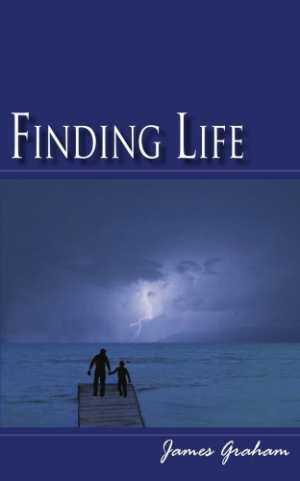Finding Life
Finding Life, James Graham’s debut novel, follows Chance Gordon as he goes through the process the title indicates. Chance’s story of rebirth is steeped in memory and the sadness and hope of nostalgia.
Graham begins the prologue with a strong, personal voice: “This is a story about me, Chance Gordon. It’s a story I tell on this date every year, of how my life was saved by the genius of friendship and the small miracles of everyday life.” Chance tells readers right away that there was an accident, but they’re left waiting to find out more about it as the story unfolds. This hook, along with the immediacy of Chance’s voice, draws readers in.
The prologue, which, arguably, is the strongest writing in the whole book, also creates a vivid setting that’s symbolic of restoration for Chase: the sights and smells of a childhood at an oyster shack. Next, Chance tells readers that his memories of his childhood friend Charlie Robbins counteract the sadness he feels. These foreshadowing elements deepen as Chance describes a haunting image of the boys rescuing two ducks from a hunter’s greedy hands. One duck is dead, so they bury it, and the other has been spared, so they bring it home.
The main body of the story begins when Chance and Charlie are in college at the University of North Carolina at Chapel Hill. Chance is in a promising relationship with a girl named Wendy, which is made stronger by the prolonged antagonistic role played by a jock named Jack. That said, the characters and encounters in this setting sometimes have hints of triteness.
When Chance takes Wendy to meet his family, Graham shows readers even more about his roots, showcasing a fun and realistic small-town dynamic. This part of the story provides another vital insight into Chance’s character: Chance is a nickname that dates back to his childhood, when he donated one of his kidneys to Charlie, giving him a second chance at life.
From the crude, cruel world of college in Chapel Hill, readers follow Chance and Wendy into the joyous early years of love and marriage. Unfortunately, their happiness quickly turns into gut-wrenching tragedy. The rest of the book is a frantic, desperate search for healing and forgiveness.
As Chance works through his pain, the reader is left feeling fulfilled and enlightened. Despite his story’s tragedy, the author’s writing style makes for a smooth, calming read.
Filled with foreboding, regret, and healing, Finding Life is a therapeutic story for anyone who’s ever faced devastating pain.
Reviewed by
Melissa Wuske
Disclosure: This article is not an endorsement, but a review. The publisher of this book provided free copies of the book and paid a small fee to have their book reviewed by a professional reviewer. Foreword Reviews and Clarion Reviews make no guarantee that the publisher will receive a positive review. Foreword Magazine, Inc. is disclosing this in accordance with the Federal Trade Commission’s 16 CFR, Part 255.

